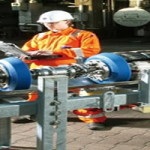HOW TO BECOME API CERTIFIED INSPECTOR?
- Basically in order to become certified as an API certified inspector, you will need to do is apply to API, meet their acceptance criteria as outlined below, and then pass the formal examinations (7 hours of exam for the main ICPs and 3 hours for the supplementary ones)
- In practice, unless you have full familiarity with the relevant codes, you are unlikely to pass the exam and will need to prepare for the examination by enrolling on a training The training course will provide you about the subject matter covered, test you using mock exams etc., and prepare you to take the API exam.
ENTRY REQUIREMENTS
- API set minimum entry requirements for candidates who want to take the ICP exams. The general principle is that candidates must be ‘employed by or under contract to an ‘authorised inspection agency or owner/user organization’. In Turkey and other countries that do not have a formal system of legally authorised inspection organisations, this is interpreted slightly differently. Inspectors who work under contract (self-employed or any registered companies) are considered eligible, as long as they can demonstrate that they have been working in the inspection field.
- The above requirements serve to exclude mainly those people who are not involved in the inspection industry and who therefore would not be suitable for API certification. In practice, most people who have been working in the inspection industry in NDT, inspection, maintenance etc. do not have too much trouble in satisfying these entry requirements.
API Exam Entry Requirements
- Below information shows the API-published entry requirements. Note that it is only necessary to satisfy one of the entry requirements (i.e. A, B, C or D):
- Entry Level A requires a Degree (or higher) in engineering with 1 year experience in the supervision or performance of inspection activities of vessels/pipes/tanks as appropriate,
- Entry Level B requires higher qualification or certificate in engineering or technology with 2 years experience in design, construction, repair, operation, or inspection vessels/pipes/tanks as appropriate, of which 1 year must be in supervision or performance of inspection activities.
- Entry Level C requires basic engineering qualification with 3 years in design, construction, repair, operation, or inspection vessels/pipes/tanks as appropriate, of which 1 year must be in supervision or performance of inspection activities.
- Entry Level D does not require any qualifications but the applicant need 5 or more years experience in design, construction, repair, operation, or inspection vessels/pipes/tanks as appropriate, of which 1 year must be in supervision or performance of inspection activities.
- Above requirements of course depend on whether you wish to sit for API 510,570 or 653 Examination.
Additional Entry Requirements for the Training Programme
- Global Alliance Academy accepts onto our API Exam Preparation Training Courses have a good chance of passing the examination. Therefore we process an application assessment procedure consisting of a CV assessment and, in marginal cases, a technical questionnaire.
- The purpose of this is to assess an applicant’s initial knowledge of some of the technical subjects that will be covered in the course, and subsequently in the API examinations. This will give us an idea as to whether you will do sufficiently well on the course to give you a fair chance of passing the examinations
Training Outline
During the training we will refer to the technical standards indicated below:
- API 570, Piping Inspection Code: Inspection, Repair, Alteration, and Re-rating of In Service Piping Systems
- API RP 571, Damage mechanisms affecting fixed equipment in the refining industry,
- API RP 574, Inspection Practices for Piping System Components.
- API RP 577 Welding and Metallurgy
- API RP 578, Material Verification Program for New and Existing Alloy Piping Systems
- ASME V, Non-destructive Examination,
- ASME IX, Welding Qualifications
- ASME B16.5, Pipe Flanges and Flanged Fittings
- ASME B31.3, Process Piping
API 570 Training Syllabus Content:
- Code calculations and inspection intervals for new and degraded pipework including consideration for:
- Corrosion rates and allowances
- Remaining service life and inspection intervals
- Weld quality factors (based on ASME B31.3)
- Thermal expansions
- Thickness calculations of pipes, blanks
- Hydraulic, pneumatic and leak testing
- Impact test requirements and exemptions
- Minimum wall thickness and working pressure/temperature requirements for pipework flanges (ASME B16.5 basis)
- Weld heat treatment requirements
- Weld WPS/PQR evaluation (ASME IX basis): SMAW/GTAW/SAW
- General rules for welding (ASME B31.3 and API 570 basis)
- NDT requirements of ASME V: Visual/RT/DP/MPI
- Techniques
- Calibration
- Examination
- Interpretation
- PMI requirements and procedures





